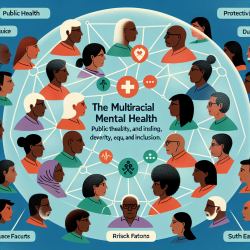Enhancing Support for Rural Mature-Aged Health Students: Insights for Practitioners

The recent study titled "Study supports for rural mature-aged university health students: a Stakian multicase study" offers critical insights into the support mechanisms necessary for rural mature-aged students in nursing and allied health fields. These findings are invaluable for practitioners who aim to enhance their skills and create better outcomes for children through effective support strategies.
Key Findings and Implications for Practitioners
The study underscores the importance of tailored support for mature-aged students in rural areas, focusing on several key areas:
- Acknowledging the Mature-Aged Cohort: Recognizing the diverse experiences and non-university commitments of mature-aged students is crucial. This acknowledgment can foster a more inclusive and supportive learning environment.
- Fostering Connections: Creating opportunities for mature-aged students to connect with peers can enhance their academic and social experiences. Practitioners can facilitate study groups and social events specifically for this cohort.
- Financial Support: Making university more affordable through scholarships and financial aid tailored to the needs of mature-aged students, such as childcare and travel expenses, can significantly alleviate financial burdens.
- Adapting Course Content: Recognizing prior learning and life experience can help mature-aged students by providing exemptions for relevant subjects, thus allowing them to focus on new learning.
- Placement Support: Flexible placement options and local placement planning can better accommodate the unique needs of mature-aged students, ensuring they can balance their studies with other commitments.
Practical Steps for Implementation
Practitioners can take several steps to implement these findings and improve support for mature-aged students:
- Develop Age-Specific Support Programs: Create support programs that specifically address the needs of mature-aged students, such as flexible scheduling and tailored academic advising.
- Engage with Community Resources: Leverage local community resources to provide additional support, such as childcare services and local scholarships.
- Enhance Communication: Improve communication channels between students, faculty, and support staff to ensure mature-aged students are aware of and can access available resources.
- Promote Peer Support Networks: Facilitate the formation of peer support networks to help mature-aged students share resources and support each other.
Encouraging Further Research
While the study provides a robust foundation, further research is essential to explore the long-term impacts of these support mechanisms on student success and workforce retention. Practitioners are encouraged to engage in ongoing research and share their findings to contribute to the broader knowledge base.To read the original research paper, please follow this link:
Study supports for rural mature-aged university health students: a Stakian multicase study.
Citation: Quilliam, C., Crawford, N., McKinstry, C., & Buccheri, A. (2024). Study supports for rural mature-aged university health students: a Stakian multicase study. BMC Medical Education. https://doi.org/10.1186/s12909-024-05128-4










